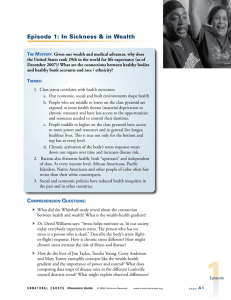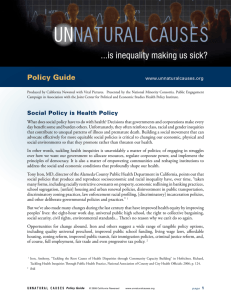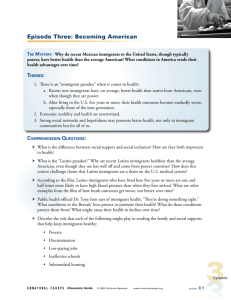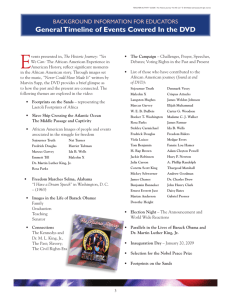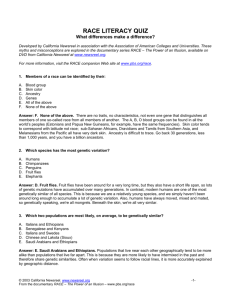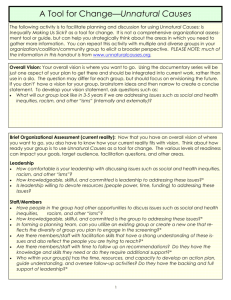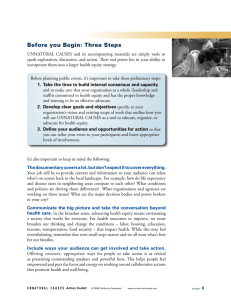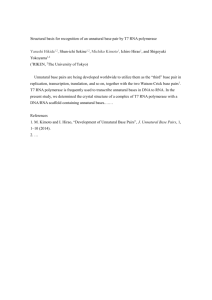UNNATURAL CAUSES
advertisement
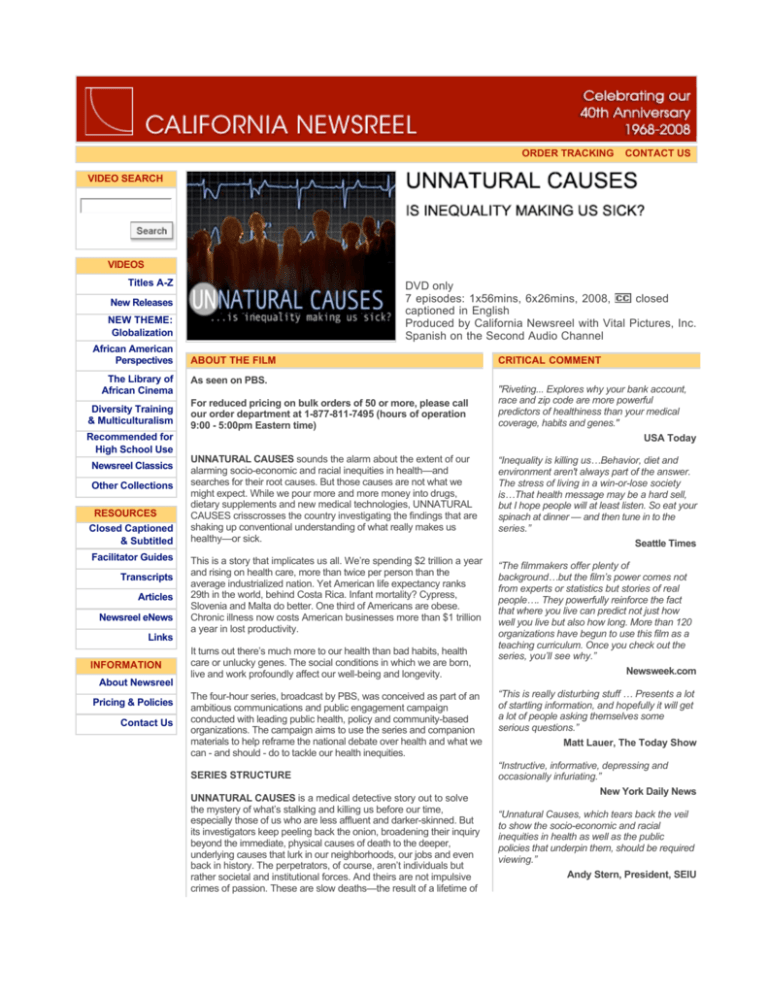
ORDER TRACKING CONTACT US VIDEO SEARCH VIDEOS Titles A-Z DVD only 7 episodes: 1x56mins, 6x26mins, 2008, closed captioned in English Produced by California Newsreel with Vital Pictures, Inc. Spanish on the Second Audio Channel New Releases NEW THEME: Globalization African American Perspectives The Library of African Cinema Diversity Training & Multiculturalism Recommended for High School Use Newsreel Classics Other Collections RESOURCES Closed Captioned & Subtitled Facilitator Guides Transcripts Articles Newsreel eNews Links INFORMATION About Newsreel Pricing & Policies Contact Us ABOUT THE FILM As seen on PBS. CRITICAL COMMENT For reduced pricing on bulk orders of 50 or more, please call our order department at 1-877-811-7495 (hours of operation 9:00 - 5:00pm Eastern time) "Riveting... Explores why your bank account, race and zip code are more powerful predictors of healthiness than your medical coverage, habits and genes." USA Today UNNATURAL CAUSES sounds the alarm about the extent of our alarming socio-economic and racial inequities in health—and searches for their root causes. But those causes are not what we might expect. While we pour more and more money into drugs, dietary supplements and new medical technologies, UNNATURAL CAUSES crisscrosses the country investigating the findings that are shaking up conventional understanding of what really makes us healthy—or sick. “Inequality is killing us…Behavior, diet and environment aren't always part of the answer. The stress of living in a win-or-lose society is…That health message may be a hard sell, but I hope people will at least listen. So eat your spinach at dinner — and then tune in to the series.” Seattle Times This is a story that implicates us all. We’re spending $2 trillion a year and rising on health care, more than twice per person than the average industrialized nation. Yet American life expectancy ranks 29th in the world, behind Costa Rica. Infant mortality? Cypress, Slovenia and Malta do better. One third of Americans are obese. Chronic illness now costs American businesses more than $1 trillion a year in lost productivity. “The filmmakers offer plenty of background…but the film’s power comes not from experts or statistics but stories of real people…. They powerfully reinforce the fact that where you live can predict not just how well you live but also how long. More than 120 organizations have begun to use this film as a teaching curriculum. Once you check out the series, you’ll see why.” Newsweek.com It turns out there’s much more to our health than bad habits, health care or unlucky genes. The social conditions in which we are born, live and work profoundly affect our well-being and longevity. The four-hour series, broadcast by PBS, was conceived as part of an ambitious communications and public engagement campaign conducted with leading public health, policy and community-based organizations. The campaign aims to use the series and companion materials to help reframe the national debate over health and what we can - and should - do to tackle our health inequities. SERIES STRUCTURE UNNATURAL CAUSES is a medical detective story out to solve the mystery of what’s stalking and killing us before our time, especially those of us who are less affluent and darker-skinned. But its investigators keep peeling back the onion, broadening their inquiry beyond the immediate, physical causes of death to the deeper, underlying causes that lurk in our neighborhoods, our jobs and even back in history. The perpetrators, of course, aren’t individuals but rather societal and institutional forces. And theirs are not impulsive crimes of passion. These are slow deaths—the result of a lifetime of “This is really disturbing stuff … Presents a lot of startling information, and hopefully it will get a lot of people asking themselves some serious questions.” Matt Lauer, The Today Show “Instructive, informative, depressing and occasionally infuriating.” New York Daily News “Unnatural Causes, which tears back the veil to show the socio-economic and racial inequities in health as well as the public policies that underpin them, should be required viewing.” Andy Stern, President, SEIU grinding wear and tear, thwarted ambition, segregation and neglect. But this is also a story of hope and possibility, of communities organizing to gain control over their destinies—and their health. The good news is that if bad health comes from policy decisions that we as a society have made, then we can make other decisions. Some countries already have, and they are living longer, fuller lives as a result. EPISODE ONE: In Sickness and In Wealth (56 min.) The hour-long opening episode paints the big picture. Set in Louisville, Kentucky, it is a story about health, but it’s not about doctors or drugs. It’s about why some of us get sicker more often and die sooner in the first place. What are the connections between healthy bodies and healthy bank accounts and skin color? How do social policies and the way we organize work and society affect health? Solutions, the show suggests, lie not in more pills but in more equality. "In Sickness and In Wealth" sets out the series’ main themes: that health and longevity are correlated with socio-economic status, that people of color face an additional health burden, and that our health and well-being are tied to policies that promote economic and social justice. Six additional 28-MINUTE EPISODES, each set in a different racial / ethnic community, explore different health pathways (these segments were bundled together two to an hour for the PBS broadcast): Bad Sugar (28 min.) This episode travels to the O’odham Indian reservations of southern Arizona, which are marked with the dubious distinction of perhaps the highest rates of Type 2 diabetes in the world. There it explores a re-conceptualization of chronic disease as the body’s response to ‘futurelessness’ – a condition arising from decades of oppression and historical trauma. It looks at the prospects for a new approach that places a community taking control of its own destiny as fundamental to regaining health. Place Matters (28 min.) Recent Southeast Asian immigrants, along with Latinos, are moving increasingly into what have been neglected Black urban neighborhoods—and now their health is being eroded too. What policies and investment decisions foster neighborhood environments that harm—or enhance—the health of residents? And what local actions can make a difference? SEND TO A FRIEND Send this page to a friend PRICING College, Corporation, Gov't Agency: DVD $295.00 $199.00 when you buy 5 or more titles! High Schools, Public Libraries, HBCUs & Qualifying Community Organizations ONLY DVD $79.95 Home Video - Restrictions Apply Not Available Educational Preview - Educational Institutions Only! Not Available Select a license and format and click "Add" RELATED VIDEOS HEALTH FOR SALE RACE - THE POWER OF AN ILLUSION MAQUILAPOLIS THE BELOVED COMMUNITY RELATED LINKS To learn more about the series and get involved with the public impact campaign, visit: www.unnaturalcauses.org When the Bough Breaks (28 min.) Infant mortality rates among African Americans remain twice as high as among whites. African American women with graduate degrees still face a greater risk of delivering pre-term, low birth-weight babies than white women who didn't finish high school. In this medical detective story, researchers are circling in on the added burden of racism through the life-course as a long-term risk factor. Becoming American (28 min.) Recent Mexican immigrants, though generally poorer, tend to be healthier than the average American. But the longer they’re here, the worse their relative health becomes. This is known as the “Hispanic Paradox.” Is there something about life in America that is harmful to health? Conversely, what is protective about new immigrant communities that we can all learn from? Can community and labor organizing reverse the downward trend? Not Just a Paycheck (28 min.) How does employment policy and job insecurity affect our health? Residents of western Michigan struggle against depression, domestic violence and an uptick in heart disease and diabetes when the largest refrigerator factory in the country shuts down. Ironically, the plant is owned by a Swedish company, where shutdowns, far from devastating lives, are relatively benign events – for some even an opportunity – because of Swedish government policies rooted in an ethos of shared responsibility. Collateral Damage (28 min.) Patterns of uneven development mark the Pacific islands and diabetes, cardiovascular and kidney diseases, even tuberculosis, are taking a growing toll on Pacific Islander populations. In the Marshall Islands.and in the unlikely spot of Springdale, Arkansas we witness how U.S. occupation, military policy and globalization impact people’s health--often in unanticipated ways. THE COMPANION WEB SITE For Discussion Guides, Action Toolkits, Backgrounders, Handouts and more visit: www.unnaturalcauses.org Home Titles A-Z New Releases Shopping Cart Order Tracking Contact Us
